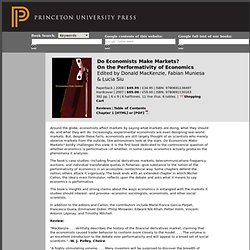

Do Economists Make Markets? On the Performativity of Economics. Around the globe, economists affect markets by saying what markets are doing, what they should do, and what they will do.

Increasingly, experimental economists are even designing real-world markets. But, despite these facts, economists are still largely thought of as scientists who merely observe markets from the outside, like astronomers look at the stars. Do Economists Make Markets? Boldly challenges this view. Donald MacKenzie. Office hours Mondays, 2.30pm to 4.30pm in Induction Week and teaching weeks.

Research Interests. An Engine, Not a Camera. Models. Behaving. Badly.: Why Confusing Illusion with Reality Can Lead to Disaster, on Wall Street and in Life. A Demon of Our Own Design: Markets, Hedge Funds, and the Perils of Financial Innovation. "A risk-management maven who's been on Wall Street for decades…Bookstaber's book shows us some complex strategies that very smart people followed to seemingly reduce risk—but that led to huge losses.

" (Newsweek) "Mr. Bookstaber is one of Wall Street's 'rocket scientists'--mathematicians lured from academia to help create both complex financial instruments and new computer models for making investing decisions. In the book, he makes a simple point: The turmoil in the financial markets today comes less from changes in the economy--economic growth, for example, is half as volatile as it was 50 years ago--and more from some of the financial instruments (derivatives) that were designed to control risk.
" (The New York Times) "Bright sparks like Mr Bookstaber ushered in a revolution that fuelled the boom in financial derivatives and Byzantine 'structured products.' Erik Olin Wright. Following quick on the heels of publication of Russell Jacoby's review of Erik Olin Wright's Envisioning Real Utopias in Dissent, Michael Burawoy has written a detailed reply stressing the importance of Wright's project and rescuing it from the tangle of Jacoby's at times ad hominem attack, an excerpt of which reads: Wright seems to know nothing about the history of utopian thought, communities, or cooperatives.

He refers to exactly one book in the utopian tradition, Martin Buber's 1949 Paths in Utopia. Buber's book closed with a discussion of the kibbutz, a subject that would seem to call out to Wright. After all, the kibbutz is a "real utopia" with a socialist ethos and decades of practice. Are there lessons to be found here? Explaining Institutional Change. This book contributes to emerging debates in political science and sociology on institutional change.

Its introductory essay proposes a new framework for analyzing incremental change that is grounded in a power-distributional view of institutions and that emphasizes ongoing struggles within but also over prevailing institutional arrangements. Five empirical essays then bring the general theory to life by evaluating its causal propositions in the context of sustained analyses of specific instances of incremental change.
These essays range widely across substantive topics and across times and places, including cases from the United States, Africa, Latin America, and Asia. The book closes with a chapter reflecting on the possibilities for productive exchange in the analysis of change among scholars associated with different theoretical approaches to institutions. The Colonizer's Model of the World: Geographical Diffusionism and Eurocentric History. In this book, the late James Blaut attempted to demonstrate the existence of a theory of Eurocentric diffusionism among mainstream scholars and the general public, as well as reasons for its falsity and the veracity of a competing theory.

Eurocentric diffusionism is defined as the concept that the internal qualities of Europe led to the modernization of non-European countries after colonialism, rather than utilization of the resources of those continents themselves, which is the idea that Blaut supports. The concept of an "Inside" versus an "Outside" is repeatedly mentioned, with Europe or "Greater Europe" said to be conceptualized as a focal point that gradually spreads its inventions and discoveries outward to the non-producers of the world in other continents. Colonialism is legitimized by depicting non-European regions of the world as empty both physically and culturally. His own selected definitions of Europe and non-Europe are problematic. Human Rights and Empire: The Political Philosophy of Cosmopolitanism. The Economics of Global Turbulence: Amazon.co.uk: Robert Brenner. First of all, a book on economics that gets thumbs up from both The Nation & The Wall Street Journal should get a wide readership.

In the field of economics, where neoclassical and neoliberal dogmatism is dominant to the point of being stifling, it is important to open the windows to let fresh air in. The book's main thrust is to provide an alternative hypothesis to explain the postwar economic boom, and the long downturn (relative to the boom) starting in the 1970s. In the orthodox neoclassical/neoliberal account, the long downturn is explained as the result of organized labor successfully fighting for high wages, which squeeze profits, which in turn reduces investment, which slows growth. (This is an explanation that works well in economic models consistent with neoliberal ideology, but not so well in explaining empirical realities.) In Prof. This has been a short, rough summary of Prof.
Benjamin Jerry Cohen, Professor, Dept. of Political Science, UCSB.